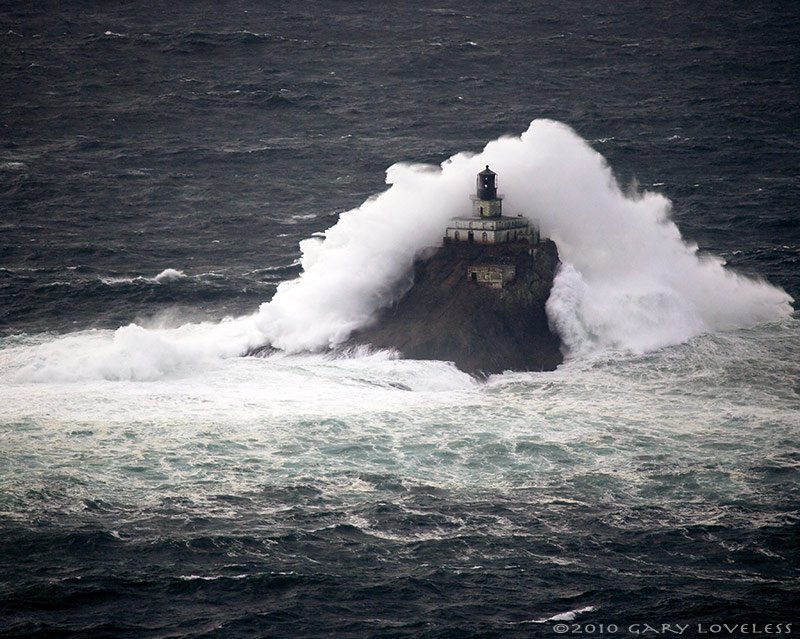
In Memorium
“Language thou art too narrow, and too weak
To ease us now; great sorrow cannot speak.”
Words attributed to John Donne around 1617, which I found yesterday in the used bookstore in Cannon Beach. I’m here because last week it was the 50th anniversary of my dad’s death, and he had his ashes scattered at sea off this coast. We had a beach cabin here, inherited from my grandmother who built it with my grandfather in the 1940s. The happiest days of my childhood, by far, were spent here when Dad was alive. I don’t visit here very often, the last time being five years ago just before I started the adventure that gave name to this travelogue. But there is nowhere else I can go to pay my respects, and it is still a very beautiful place, and very popular. My mother sold the beach house long ago, feeling it was too much trouble to make the drive and that after all, we didn’t want to go there that much.
I’m finding this extremely difficult to write, but will carry on and hope it is appropriate and edifying. On the way here, as I joined Hwy 26 at Banks, I started taking in the landmarks on this part of the drive, that had increased my excitement as a child as we got closer to the end of what always seemed a very long car ride. One place, a former town called Elsie, is almost completely defunct. The old store is a grey ruin, like many sad and rotting old hamlets all over the Coast Range in Oregon. This time I took note of a sign just before the store for a road going south, that said Elsie Cemetery. I had been driving all day through little farm towns in the northwest Willamette Valley, and had noticed several signs for cemeteries in very small, seemingly almost irrelevant towns. This is not new, of course. They all have them, from the days when people must have had different ideas about their towns.
I thought that these people must have invested whole heartedly in the hope and promise of the little town they made, their homes where they grew or raised or made something, the businesses they opened, the government they established, the organizations they formed, and the place they made to lay their bodies to rest, for their descendants to visit, and be laid to rest in turn. A cemetery says a lot about where people call home. They are serious about it. This was where they belonged. They assumed it was relevant, and would stay relevant. And now, does anybody come? Is it, as some say now, a waste of space?
I had entered into this project with happiness, that I was able to go and honor Dad with gratitude on the 50th anniversary of his death. To take stock of all that has happened, and where I am now. I am once again strong and healthy, and feel ready to see what life as an elder will bring. The man who owns the bookstore told me that traditional societies considered you an elder on your 60th birthday. Only a few more months. But I also feel sad. I do, finally, feel the truth of the saying that you can’t go home again. The first evening here, walking back from watching a warm sunset on the beach, I turned toward the familiar street that ends there, and for a brief, confusing moment felt like it was time to be heading back home to the cabin in the twilight. But I can’t. Never again.
That buoyant, intrepid little girl, who kept a defiant sparkle no matter what, who was sustained by the beauty of this place, the scent of the forest, the feeling of the air, the deep quiet and lost-in-space-and-time magic of coming here–I kept seeing her, in every familiar place I walked. I couldn’t do anything about her life, her loss, her loneliness, her future. I felt frustrated that I’d not taken care of everything, as my dad asked me to do before he died.
And of course I can’t do anything about the changes that arrive to this place, either. I have long, long since let go of any thought of buying another place here. Cannon Beach has slowly evolved more and more into an ersatz town for silly people with nothing but spare cash to recommend them. One of the two little grocery stores is gone, leaving the ‘new’ one with the contrived marine theme. But there is a store that sells only vinegar. A store that only sells socks. The gas station is gone. The school is closed. And it has no cemetery, something I’ve never thought of before.
The next day, yesterday, I prepared to go on my pilgrimage. On the suggestion of my research department, I sorted out the best flowers from a memorial bouquet, disposed of the rest, and walked out of the campground and up the street to our old cabin. It was brilliantly sunny, and looking at the new vacation homes that have been built in our little neighborhood was interesting, as was remembering what used to be there, and spotting the houses that were still there. Some people are doing whole tear-downs and erecting large places. Of course.
I got to our place, and saw they had added a section to the side, making it about a third larger. I walked up the drive a little to see if I could guess where the old wooden outhouse had stood. It was hard to tell. I looked across the street where the big houses had taken the place of the deep old woods where I used to go to play and just be. Walking up the street to the top of the dune, I remembered what a huge hill it was to us kids, and what a huge reward it was to achieve the top and finally see the beach in all its glory. Then my little brother and I would launch ourselves down the sand path, and run as fast as possible all the way down, not worrying if we fell and slid down the sand dune. Anyway, there it was, The Cove, the place that was the very heart of me as a child. Still the same, every shape and form familiar.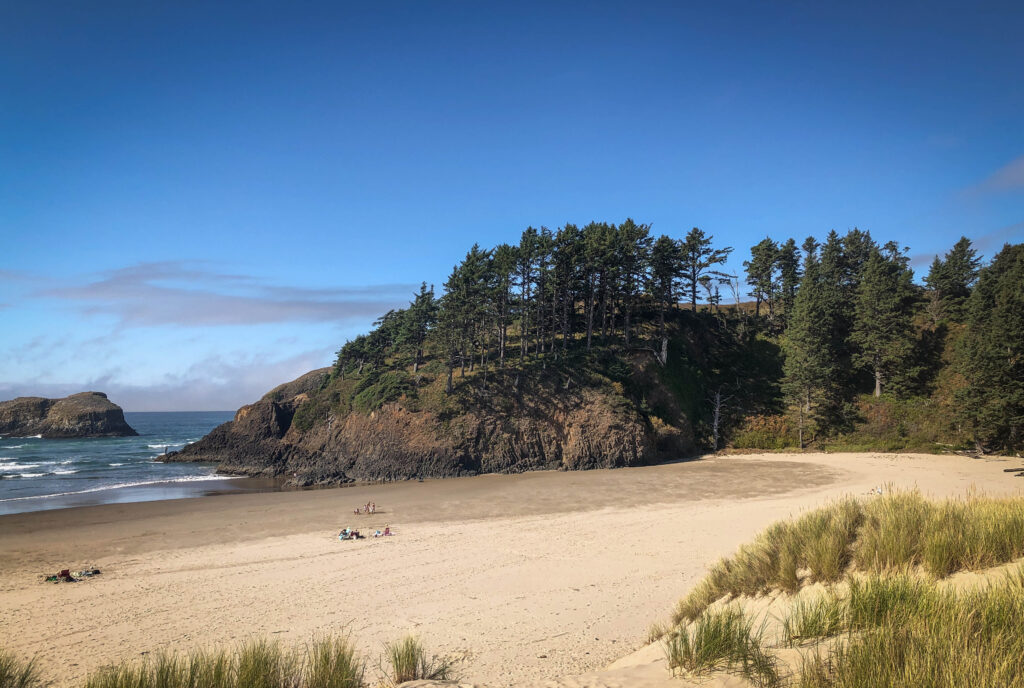
I walked straight to the rocks and began climbing out toward the ocean, glad I wasn’t wearing flip flops, but just my old TopSiders. I had one hand free to hold the rocks on my right, and the other held the flowers.
I knew the route well, though it isn’t marked, and with much less assurance than I had as a youth, carefully stepped my way up and along the edge of the headland, toward a hidden place I knew opened out, around a bit of a scary corner that involved edging around that same jutting piece of basalt. So far, so good. Then I determined to go up beyond that spot to a place where you can either go up to the right, to the forested top of the headland, or go to the left, out a long ridge of rock. It was a secret place, invisible from land, where I used to lead my little brother to watch the high tide smash and throw up tall plumes of spray. He used to whine a bit about going there because just as you get to the place where you turn toward the rock ridge, you are forced to go one way or the other by a very precipitous cliff that drops straight down to a hidden cove, with a beach and caves only accessible at very low tides.
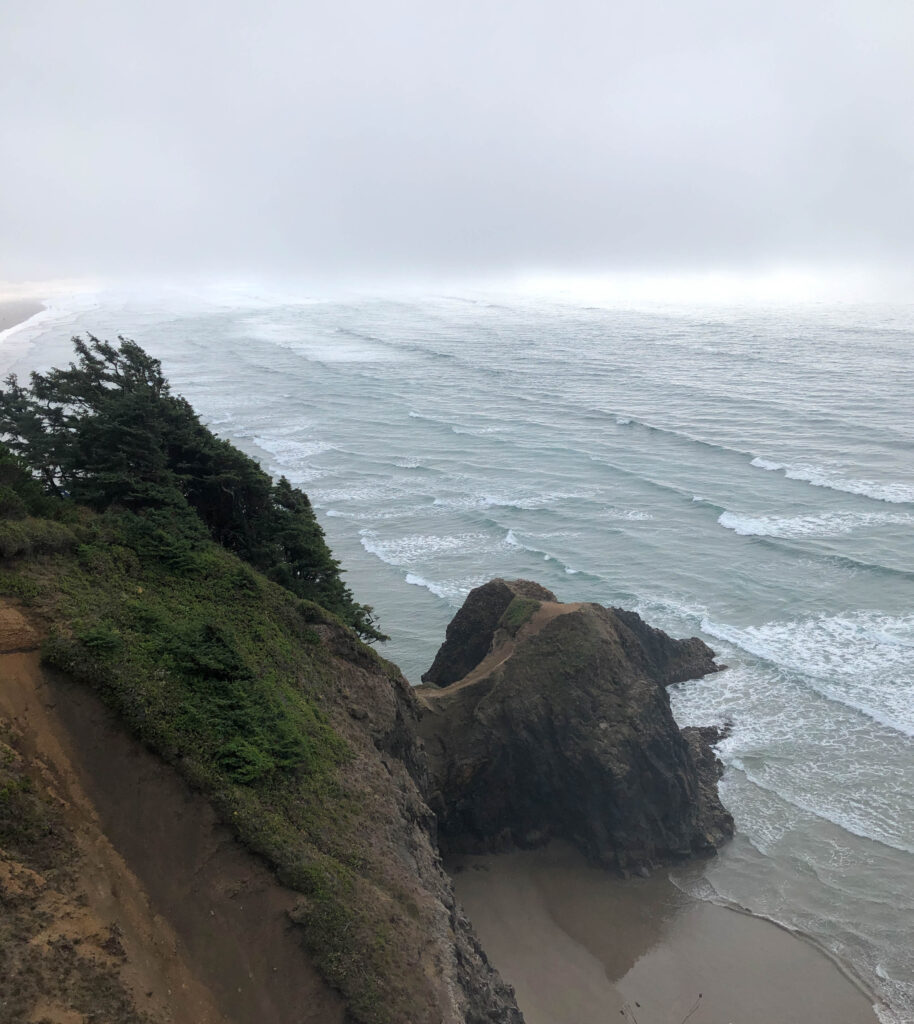 This junction is like a saddle, and we always called it The Gap. It is all broken sandstone, eroded and sliding down as you try to climb up. You can’t really sit on the gap and look over, it is too dangerous, but you can lie on your belly and look over, before heading up to the left. This time, as my shoes were sliding on the sandstone talus, I was using one hand to steady on the steep ground, whilst gripping the flowers. I would stop, when my foot slid a bit, and steady. As I was passing The Gap, I looked up to my left (right in the picture), and remembered that coming down would be mostly sliding, and wondered how I could be sure I would slide the right way, and not straight over the edge of The Gap and die on the beach far below. Sliding the other way also would be bad, as there were rocks and finally the ocean on that side too.
This junction is like a saddle, and we always called it The Gap. It is all broken sandstone, eroded and sliding down as you try to climb up. You can’t really sit on the gap and look over, it is too dangerous, but you can lie on your belly and look over, before heading up to the left. This time, as my shoes were sliding on the sandstone talus, I was using one hand to steady on the steep ground, whilst gripping the flowers. I would stop, when my foot slid a bit, and steady. As I was passing The Gap, I looked up to my left (right in the picture), and remembered that coming down would be mostly sliding, and wondered how I could be sure I would slide the right way, and not straight over the edge of The Gap and die on the beach far below. Sliding the other way also would be bad, as there were rocks and finally the ocean on that side too.
I have indeed done this many times in the past, without ever doubting for a moment that I could manage to slide exactly where I meant to. I would tell my brother to hush and just do it, and we always did. It has been decades since the last time, and though I am fit enough to do so, I have not stayed in practice for such physical courage. So, sitting there just above The Gap, just to the right of the saddle in the picture, I gathered my thoughts and weighed my priorities and decided that the time was long over for me to be a goddam hero. Ok, Dad? I flung the flowers over the edge of The Gap with a quick gesture of my left hand, settled my butt into a groove that rainwater had worn in the way, and proceeded to inch my way back to safety.
Refusing to think what a foolhardy thing it was, and what the easily possible consequences could have been, I still did not want to navigate down the rocks I had just come up. I did know another way, that entailed climbing up further, in a spot where the trees of the top of the headland came down to near where I was. I went up that way, grabbing roots and branches with both hands to scale up to the top, where I came upon a group of about fifteen boys, maybe sixteen years old, gathered around a fire pit they had dug, just standing about, and looking almost identical to one another. They had music playing, which sounded interesting, and I wish I had asked what it was. They had strung hammocks in the trees and some were up there, looking down at me. I quickly looked for bottles or growlers or other signs of debauchery, but saw none. Who can say? The youth of today are too doped with psychotropic drugs to party properly. They just stared.
I said hello, and they said ‘how was the climb?’ I said, “A lot harder than it used to be.” They seemed baffled, and I said it was easier when I was ten. Changing the subject, I asked if I could pass through their camp. A polite yes of course, and I continued up the trail through waist-high salal, blackberry, and wild roses full of rosehips to a grassy spot at the peak of the headland, officially called Chapman Point.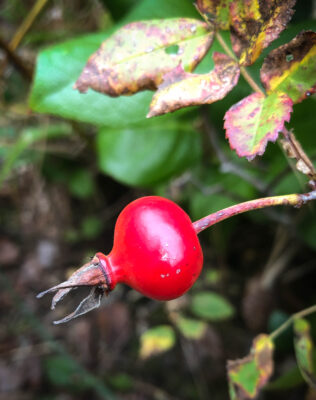
There was a bearded man up there clad in only shorts and a broad straw hat. I apologized for interrupting his solitude, and took some pictures and made a video for my research department. As I stood there, the wind shifted and a fog was quickly rolling in. The man observed that it had dropped fifteen degrees in five minutes, and headed back down the much, much easier trail that traversed the woods and gently switchbacked down to the beach in The Cove. I was not able to take a picture of Tillamook Head lighthouse way, way out on its rock, because it was gone in the fog.
The lighthouse, our featured photo, has been abandoned for a long time, because it was insanely impractical to even get onto the rock where it sits, causing much loss of life, and much misery for the men keeping the light. Eventually a woman named Mimi bought it with the idea of having people pay to store their loved ones’ ashes there. She named it Eternity At Sea, and put the remains of a lot of people there before she too had to give up on it. I read they managed to get most of the ashes out of there, but there are 30 something urns left, for some reason, and apparently they aren’t made of good material so the sea air has corroded them and nobody knows if they aren’t just lying around in the place.
But why would anyone want to send their loved one to an eternity at sea? Feeling as unmoored as I do, I can say it is hardly appealing. I think I have an increased appreciation for what being at home on earth means, and in the earth, eventually. This probably makes me an elder–this, and just the cultivation of acceptance.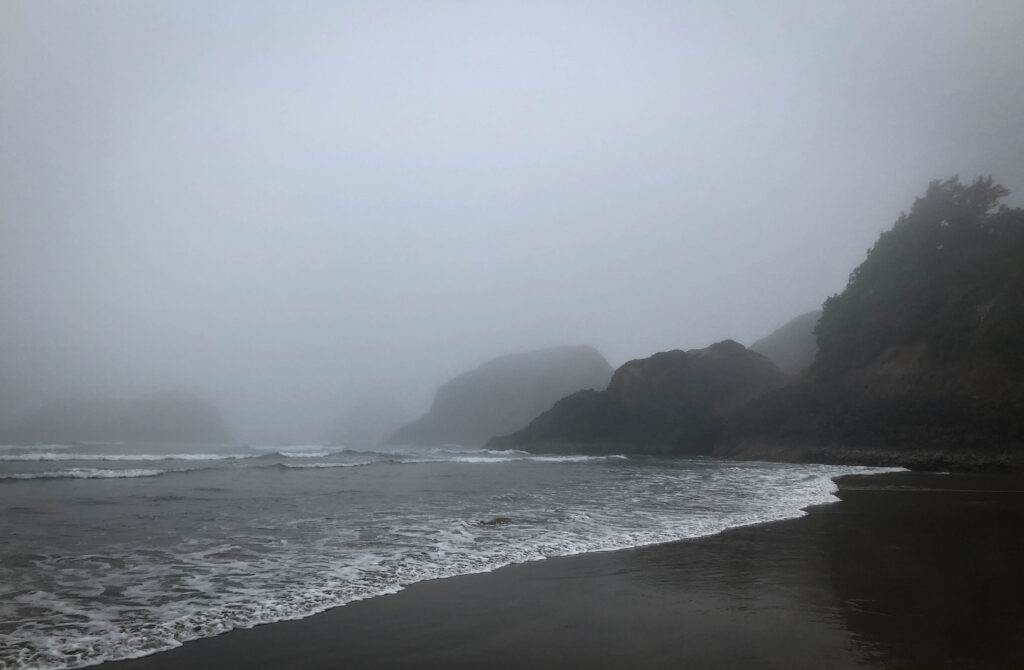
The day had indeed changed, and I came down the easy way and headed for the old candy shop that is still there, and run by the granddaughter of the founder. 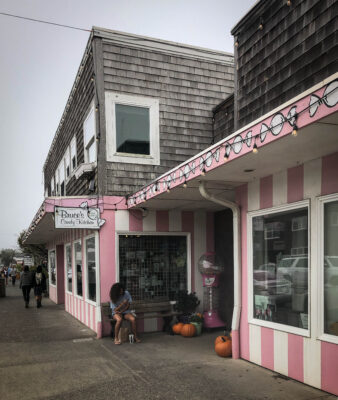 Being on vacation, I bought everything I wanted and ate some of it on the spot.
Being on vacation, I bought everything I wanted and ate some of it on the spot.
But there you go Dad, your ashes are totally adrift. It was considered the sophisticated thing to do in those days, as were many other things that have allowed us to feel free of restrictions and not feel much else. And as usual, the book I am reading has a parallel commentary. Emma, that is, and her virtual imprisonment at Hartfield, her ancestral home, in the totally interdependent village of Highbury where she has to put up with everyone, like them or not, and they have to put up with her. And will go on doing so until her remains rest there too. Blood and soil. I told the bookstore owner, who was concerned about “community”, that I was afraid that community only formed from necessity. I said “If you have enough money, you don’t have to put up with anybody, ever.”
The wind shifted again, and it’s sunny now, for the moment, and I want to go on and wander a bit and enjoy what I can. I feel better now for having written all this.

